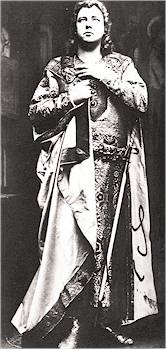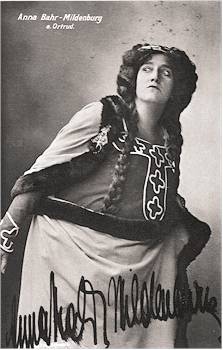Czech-(German) soprano, 1898 - 1958 Biographical notes: She was born in Theresienstadt and trained first at the Prague Conservatory. Then she studied
with Erik Schmedes and Anna Bahr-Mildenburg making her debut as Elsa at the Linz Opera House in 1919. Engagements followed at Brno, at the Deutsches Theater in Prague and at the Munich
State Opera where she sang mostly Wagnerian repertoire. In 1925 she made her debut as Sieglinde at the Metropolitan where she appeared until 1934/35. She excelled as Elsa, Elisabeth,
Sieglinde, Senta, Eva as well as in the American premieres of Alfano’s Madonna Imperia, Pizzetti’s Fra Gherardo, Verdi’s Simon Boccanegra and Mussorgsky’s The Fair Sorochinstsi. In
1926 she was engaged by Bruno Walter to appear as Euryanthe at the Städtische Oper Berlin and subsequentley changed to the Berlin State Opera where she ws contracted until 1943. Berlin was
to become the artistic focal point of her career. During Winifred Wagner’s era she became one of the most admired members in the singing troup of Bayreuth appearing as Senta, Elisabeth
(under Toscanini), Elsa, Sigelinde and Eva. She was admired at the Salzburg Festival as Euridice (1931), Rezia (1933) and Donna Elvira (1934). She enjoyed great success at Covent Garden where
she sang Sieglinde in the 1937 Ring cyles and Eva in 1934. Her large repertory there included not only the Wagnerian roles but also the title roles in Die ägyptische Helena, Jenufa and Iphigénie
en Tauride as well as Djula in Gotovac’s Ero the Joker, Marguerite, Tosca and Pamina. The public loved her Marie in Smetana’s The Bartered Bride, a role particularly suited to her as a born
Bohemian. Guest appearances took to La Scala, Covent Garden, Vienna, Paris, Brussels, Dresden and Amsterdam. After the war Maria Müller lived in her home in Bayreuth, but returned to the
Berlin Opera for one season in 1950. As Elsa As Sieglinde Maria Müller at the Bayreuth Festival Maria Müller and Margarete Klose in Gluck’s “Orfeo”, 1937
Recordings: |
Wagner - The Flying Dutchman (Kraus 1942 live/Berglund, Hofmann, Völker) |
Preiser |
Wagner - Lohengrin (Heger 1941 live/Völker, Hofmann, Klose, Prohaska) |
Preiser |
Wagner - Die Meistersinger von Nürnberg (Furtwängler 1943 live/ Prohaska, Lorenz, Greindl, Fuchs) |
LYS |
Wagner - Tannhäuser (Elmendorff 1930/Pilinsky, Jost-Arden, Janssen, Andresen) |
Malibran Pearl |
Wagner - Die Walküre (Furtwängler 1937 live/Bockelmann, Flagstad) |
Myto |
Wagner - Die Walküre (Friscay 1951 live/Hermann, Suthhaus, Buchner, Klose) |
Myto |
Bayreuth 1936 (Excerpts Lohengrin and Die Walküre/Tietjen) |
Teldec |
The Art of Maria Müller (Arias by Wagner, Weber, Puccini. Songs by Wagner, Brahms, Reger
and Schubert) |
Preiser - LV |
Vienna State Opera Live Vol. 18 |
Koch |
Mozart - The Supreme Operatic Recordings |
Pearl |
Schubert on Record Vol. 2 |
EMI |
Legendary Singers at Lindenoper, Berlin |
Minerva |
Mike Richter’s Opera Page: The Record of Singing Vol. 3 |
CD-ROM |
As Senta Portrait 1932
Comment: Favoritism and neglect of the recording companies often have little (or even nothing) to do with
the artistic power of the singers in question. At her time Maria Müller was at her absolute peak as “Jugendlich-Dramatische” enjoying a truly international career. Astonishingley, there are too few recordings of her art.
Like Tiana Lemnitz, Maragrete Teschemacher and Trude Eipperle she possessed a typical “German soprano voice.” I do not intend to discuss the political situation that all
German singers had to face during the 30ies and 40ies in their own country (although it is important to be aware of and think about this
fact). However, we should not ignore that Maria Müller profited from the more numerous performances of Wagner’s works by the Nazi regime. She was one of the leading singers
appearing at the “Bayreuth Kriegsfestspiele” until 1944. Nevertheless, in my opinion we should hesitate to judge the singers by their behaviour in these extremely difficult times. Quite
objectively, the 30/40ies have produced a number of great German singers. Müller’s most beautiful opera recording is perhaps Das süsse Lied verhallt from Lohengrin
opposite Franz Völker, conducted by Heinz Tietjen. This recording made in 1936 has been only equalled by Emmy Bettendorf and Lauritz Melchior’s rendition. Bettendorf/Melchior give us a
more dramatic interpretation, Müller/Völker sing in a perfect balance of pure lyricism. She made some very fine lieder recordings accompanied by Michael Raucheisen. In him we face
the same “problem.” He was responsible for the Berlin broadcasting programs until the end of the war and, at the same time, we owe him a number of the greatest lieder recording editions. Maria
Müller sang in compilations of Beethoven, Brahms and Reger. Beyond the well-known lieder composers (Mozart, Beethoven, Schubert, Schumann, Brahms, Loewe, Wolf, R. Strauss),
Raucheisen and his singers also drew attention to other magnificent lieder composers such as Robert Franz, Adolf Jensen, Hans Pfitzner, Otto Nicolai, Peter Cornelius, Max Reger and Othmar Schoeck.
 |
Zurück von ihm!
(Elisabeth in Tannhäuser / Wagner / Columbia 1930 / Heinz Tietjen) |

